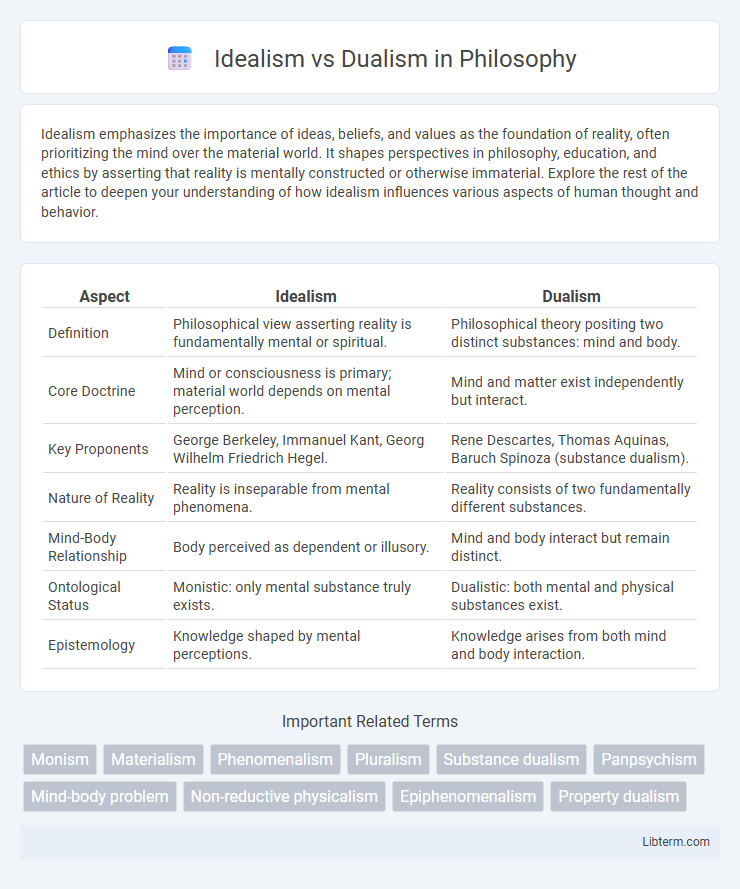Idealism emphasizes the importance of ideas, beliefs, and values as the foundation of reality, often prioritizing the mind over the material world. It shapes perspectives in philosophy, education, and ethics by asserting that reality is mentally constructed or otherwise immaterial. Explore the rest of the article to deepen your understanding of how idealism influences various aspects of human thought and behavior.
Table of Comparison
| Aspect | Idealism | Dualism |
|---|---|---|
| Definition | Philosophical view asserting reality is fundamentally mental or spiritual. | Philosophical theory positing two distinct substances: mind and body. |
| Core Doctrine | Mind or consciousness is primary; material world depends on mental perception. | Mind and matter exist independently but interact. |
| Key Proponents | George Berkeley, Immanuel Kant, Georg Wilhelm Friedrich Hegel. | Rene Descartes, Thomas Aquinas, Baruch Spinoza (substance dualism). |
| Nature of Reality | Reality is inseparable from mental phenomena. | Reality consists of two fundamentally different substances. |
| Mind-Body Relationship | Body perceived as dependent or illusory. | Mind and body interact but remain distinct. |
| Ontological Status | Monistic: only mental substance truly exists. | Dualistic: both mental and physical substances exist. |
| Epistemology | Knowledge shaped by mental perceptions. | Knowledge arises from both mind and body interaction. |
Introduction to Idealism and Dualism
Idealism posits that reality is fundamentally mental or immaterial, asserting that consciousness shapes the nature of existence. Dualism, primarily associated with Descartes, argues for the coexistence of two distinct substances: mind and body, each with separate ontological status. These contrasting metaphysical views address the relationship between mind, matter, and the essence of reality.
Historical Origins of Idealism
Idealism originated in ancient Greek philosophy, notably with Plato's theory of Forms, which proposed that non-material abstract forms represent the most accurate reality. This philosophical tradition evolved through thinkers like George Berkeley in the 18th century, who argued for immaterialism, asserting that reality consists solely of minds and their ideas. Idealism's historical development contrasts with Dualism, initially formulated by Rene Descartes, who posited a strict distinction between mind and body as two fundamentally different substances.
Historical Development of Dualism
Dualism, historically traced to the philosophical contributions of Rene Descartes in the 17th century, posits the existence of two distinct substances: mind and body. This dualistic framework challenged earlier monistic perspectives like idealism, which asserts that only the mind or spirit is fundamentally real. Dualism influenced the development of modern philosophy and cognitive science by establishing the mind-body problem as a central issue.
Core Principles of Idealism
Idealism asserts that reality is fundamentally mental or spiritual, positing that all objects and phenomena are manifestations of consciousness or mind. Central to this philosophy is the belief that material substances do not exist independently of perception, emphasizing the primacy of ideas and mental constructs in shaping existence. This contrasts with Dualism, which maintains a clear distinction between mind and matter as separate and interacting substances.
Fundamental Tenets of Dualism
Dualism asserts the existence of two fundamentally distinct substances: mind and body, where the mind is non-physical and the body is physical. This theory emphasizes the independence and interaction between mental phenomena and physical matter. Dualism contrasts with idealism, which posits that only the mind or spirit constitutes reality, denying or minimizing physical substance.
Key Philosophers and Their Contributions
Key philosophers in idealism include George Berkeley, who argued that reality consists solely of minds and their ideas, emphasizing the immaterial nature of existence. In dualism, Rene Descartes is pivotal for positing the mind and body as distinct substances, highlighting the separation between mental and physical realms. Immanuel Kant bridged these views by proposing that while the mind shapes experience, an unknowable reality exists beyond perception.
Major Differences Between Idealism and Dualism
Idealism asserts that reality is fundamentally mental or spiritual, with the physical world being a manifestation of the mind, whereas Dualism posits the existence of two distinct and independent substances: mind and matter. In Idealism, consciousness shapes and constitutes reality, while Dualism maintains a clear separation between mental phenomena and the physical body. The major difference lies in Idealism's monistic approach, considering only one substance (mental), compared to Dualism's dual-substance perspective, emphasizing the interaction between mind and matter.
Criticisms and Counterarguments
Critics of Idealism argue it struggles to explain the persistence of an external world independent of perception, challenging its validity in accounting for objective reality. Dualism faces criticism for the interaction problem, questioning how immaterial mind and physical body influence each other without a clear causal mechanism. Counterarguments for Idealism highlight the inseparability of perception and reality, while Dualism proponents propose emergent properties or parallelism to address interaction issues.
Impact on Modern Philosophy
Idealism, emphasizing the primacy of mind and ideas, reshaped modern philosophy by challenging materialist perspectives and influencing figures like Hegel and Berkeley. Dualism, asserting the distinct existence of mind and body, laid the groundwork for ongoing debates in philosophy of mind and cognitive science, particularly through Descartes' legacy. The contrast between Idealism and Dualism continues to impact epistemology, metaphysics, and the understanding of consciousness in contemporary philosophical discourse.
Conclusion: The Ongoing Debate
Idealism and Dualism remain central to philosophical discussions on the nature of reality and consciousness. Idealism asserts that reality is fundamentally mental or immaterial, while Dualism posits the existence of both physical and non-physical substances. The ongoing debate highlights unresolved questions about the mind-body relationship, influencing fields such as metaphysics, cognitive science, and philosophy of mind.
Idealism Infographic

 libterm.com
libterm.com